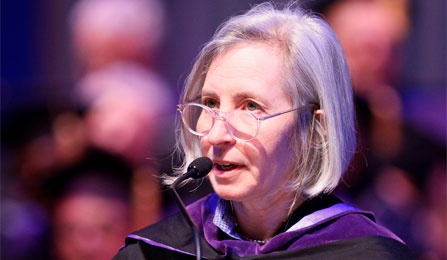The Buffalo Law Experience
Going forth with purpose

Commencement Keynote Speaker Professor Martha Minow, dean of Harvard Law School.
Law School's 123rd Commencement marks a new chapter for grads
Before a full house of family, friends and supporters in the Center for the Arts, more than 200 newly minted graduates marked a turning point in their lives on May 19 at SUNY Buffalo Law School's 123rd annual Commencement exercises.
In addition to 211 Juris Doctor degrees, five master of laws degrees in criminal law and 16 general master of laws degrees were awarded, in a ceremony whose roots stretch back to the Law School's earliest days.
Dean Makau W. Mutua said the moment signified a change in identity for the graduates. "From now onwards, you will largely be defined by your identity as a lawyer," the dean said. "And to me this means that you must reflect on what being a lawyer means for you and for our society. … As lawyers we ask you to work at the intersection of power and powerlessness with a single mission: the mission of reducing powerlessness and holding power accountable. That is your charge as new lawyers, to go forth and act as the indispensable guardians of our democracy."
University at Buffalo President Satish K. Tripathi struck an optimistic note. "As educated persons, the time to prepare and strengthen our society is now, not when the next crisis hits, but now when the outlook is getting brighter," he said. "We must not just hope but ensure the outlook for the future remains bright. You are the reasons we have such optimism for the future. We are tremendously proud of all that you have achieved, and we can't wait to see what you will contribute to the world as UB alumni."
Richard F. DiGiacomo '76, president of the SUNY Buffalo Law Alumni Association, said, "As you go through your life, I would like you to think. Think about the people you meet. Some of the most intelligent, articulate, hard-working, creative people you will meet, people who have the ability to get to the core of a problem, analyze it, find a solution, advise the people they represent of that solution or successfully argue their position to help the people they represent. I suggest most of those people are going to be lawyers – just like you."
Nicole J. Ettlinger '12, in giving the student address, reflected on the age-old promise that law school teaches one to "think like a lawyer." "For each of us, thinking like a lawyer will mean something different," she said. "But for all of us, it means something. Whether we had expected it to happen or not, the law has become part of who we are. Whether we become the next great litigators, politicians, judges, law professors – or even if we choose a different career path entirely – we are still lawyers.
"What we can learn from our three years at SUNY Buffalo Law School is to be the best lawyer possible. To work harder, speak with passion, and to always remember how important our role is to those who we represent. Every one of us will be an attribute to the legal field. I know I would be proud to have any of the members of the Class of 2012 as co-counsel, opposing counsel and even my own counsel."
The afternoon's keynote speaker was Professor Martha Minow, dean of Harvard Law School. Minow, who once clerked for U.S. Supreme Court Justice Thurgood Marshall, is well-known for her scholarship in human rights issues, with a focus on members of racial and religious minorities and women, children and persons with disabilities.
Her address centered around what to remember – and what to forget.
"Something about moments of life transition make us especially alert and attentive in ways that organize what we remember," she said. "The new, the unfamiliar, what is not already scripted – that is what we tend to remember. So what will you recall of your time here? You may well remember some of what you learned in Contracts or Con Law or Tax. You probably will remember the first days of a summer job or the first interview with a client in a clinic, or the friends you made. You actually will forget a lot. It turns out we need to forget, or at least never start remembering, some 90 percent of our experiences, because otherwise we have overwhelming sensory overload. So that's an assuring fact, if we remember it."
And she encouraged the graduates to make the transition from speculation to advocacy. "The hardest-headed, most practical legal analysis must include not just the law student's preface, 'Well, one could argue …,' but instead the lawyer's admonition, 'How should you argue?' How will other people view this action over time? How will you view it 20 years hence? How do you want to be remembered?
"… The fate of our fate is in your hands. It's not that 'we've given you a perfect world, don't louse it up.' We've given you a flawed, only partly remembered world. You each can and must have a hand in what we come to remember."
The Dean's Medal was presented to Hon. Samuel L. Green '67, recently retired as senior associate judge of the Appellate Division, Fourth Department, of the New York State Supreme Court. The Ken Joyce Distinguished Teaching Award was given to Steven R. Sugarman '85, a longtime and popular adjunct professor of basic and advanced mediation courses.